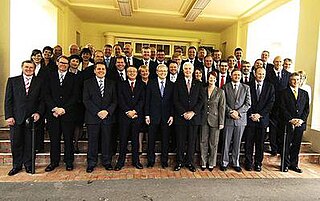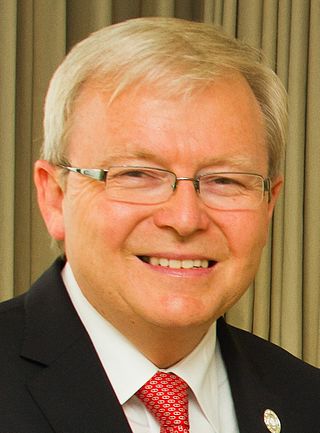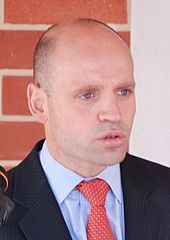
Simon Findlay Crean was an Australian politician and trade unionist. He was the leader of the Australian Labor Party (ALP) and leader of the opposition from 2001 to 2003. He represented the seat of Hotham in the House of Representatives from 1990 to 2013 and was a cabinet minister in the Hawke, Keating, Rudd and Gillard governments.

Kevin Michael Rudd is an Australian diplomat and former politician who served as the 26th prime minister of Australia, from 2007 to 2010 and June 2013 to September 2013, holding office as the leader of the Australian Labor Party (ALP). Rudd is the 23rd and current ambassador of Australia to the United States since 2023.

Julia Eileen Gillard is an Australian former politician who served as the 27th prime minister of Australia from 2010 to 2013, holding office as leader of the Australian Labor Party (ALP). She previously served as the 13th deputy prime minister of Australia from 2007 to 2010, under Prime Minister Kevin Rudd. She is the first and only female to hold either office in Australian history.

Stephen Francis Smith is the current High Commissioner of Australia to the United Kingdom and formerly an Australian politician who was a member of the House of Representatives for Perth from 1993 to 2013, representing the Australian Labor Party. He served as a minister in the Rudd and Gillard governments, including as Minister for Foreign Affairs (2007–2010), Minister for Trade (2010), and Minister for Defence (2010–2013).

Wayne Maxwell Swan, often colloquially referred to as Swanny, is an Australian politician serving as the 25th and current National President of the Labor Party since 2018, previously serving as the 14th Deputy Prime Minister of Australia and Deputy Leader of the Labor Party from 2010 to 2013, and the Treasurer of Australia from 2007 to 2013.
Faceless men is a term from Australian politics. The term is generally used to refer to men and women who exert political influence and are not elected representatives to state, territory or federal legislative bodies, yet are elected representatives to bodies that determine political party policies. However, the political tactic of elected representatives canvassing party members for support on policies varies widely amongst Australian political parties.

Mark Victor Arbib is an Australian former Labor Party politician and trade unionist, who was an Australian Senator for New South Wales from 2008 to 2012.

The first Rudd ministry (Labor) was the 64th ministry of the Government of Australia. It was led by the country's 26th Prime Minister, Kevin Rudd. The first Rudd ministry succeeded the Fourth Howard Ministry, which dissolved on 3 December 2007 following the federal election that took place on 24 November which saw Labor defeat John Howard's Liberal–National Coalition. The ministry was replaced by the First Gillard Ministry on 24 June 2010 following the resignation of Rudd as Prime Minister after a successful leadership challenge by Julia Gillard.
In Australian politics, a leadership spill is a colloquialism referring to a declaration that the leadership of a parliamentary party is vacant and open for contest. A spill may involve all or some of the leadership positions. Where a rival to the existing leader calls for a spill it may also be called a leadership challenge. When successful, it is often said that the former leader has been "rolled". In Australian English the colloquial use of the word "spill" seems to have begun in the mid-1940s with the contest to replace Prime Minister John Curtin after his death on 5 July 1945.

The first Rudd government was the executive Government of Australia formed by the Australian Labor Party (ALP) and led by Prime Minister Kevin Rudd. The Rudd government commenced on 3 December 2007, when Rudd was sworn in along with his ministry. This took place just nine days after the defeat of the Howard government, which was a Coalition of members of the Liberal and National parties, at the 2007 federal election. The Rudd government concluded on 24 June 2010 when Rudd, under pressure from an impending leadership caucus ballot, stepped down from the leadership of the ALP and was succeeded by his deputy, Julia Gillard. Rudd was re-elected leader of the Labor Party in 2013 and served a second term as prime minister.

The First Gillard ministry (Labor) was the 65th ministry of the Australian Government and was led by the prime minister, Julia Gillard. It succeeded the first Rudd ministry upon its swearing in by the Governor-General of Australia, Quentin Bryce, on 24 June 2010. It was replaced by the second Gillard ministry on 14 September 2010 after the 2010 election.

The Gillard government was the Government of Australia led by the 27th Prime Minister of Australia, Julia Gillard, of the Australian Labor Party. The Gillard government succeeded the first Rudd government by way of the Labor Party leadership spill, and began on 24 June 2010, with Gillard sworn in as Prime Minister by the Governor-General of Australia, Quentin Bryce. The Gillard government ended when Kevin Rudd won back the leadership of the Australian Labor Party on 26 June 2013 and commenced the second Rudd government.

A leadership spill of the Australian Labor Party (ALP) was held on 4 December 2006. Opposition Leader Kim Beazley was challenged by Shadow Foreign Minister Kevin Rudd, while Deputy Opposition Leader Jenny Macklin was challenged by Shadow Health Minister Julia Gillard in a joint-ticket. Rudd defeated Beazley, after which Macklin resigned, leaving Gillard to become Deputy Leader unopposed.

The Second Gillard ministry (Labor) was the 66th ministry of the Australian Government, led by Prime Minister Julia Gillard. It succeeded the first Gillard ministry upon its swearing in by Governor-General Quentin Bryce on 14 September 2010 after the 2010 election.

The Clean Energy Act 2011 was an Act of the Australian Parliament, the main Act in a package of legislation that established an Australian emissions trading scheme (ETS), to be preceded by a three-year period of fixed carbon pricing in Australia designed to reduce carbon dioxide emissions as part of efforts to combat global warming.

A leadership spill in the Australian Labor Party, the party of government in the Parliament of Australia, was held on 27 February 2012 at 10 am AEDT, followed by a ballot. The Prime Minister, Julia Gillard, announced the spill at a press conference on 23 February 2012, following the resignation of the Minister for Foreign Affairs, Kevin Rudd, from his cabinet position after months of speculation that he intended to challenge Gillard for the leadership. Rudd announced his intention to seek the leadership at a press conference on 24 February.

A leadership spill in the Australian Labor Party, the party of government in the Parliament of Australia, was held on 21 March 2013. Prime Minister Julia Gillard called a ballot for the Leadership and Deputy Leadership of the Labor Party for 4.30pm, following a press conference by former Labor Leader and Regional Minister Simon Crean over persistent leadership tensions. At the caucus meeting, no alternative candidates nominated for the positions, and so Gillard and Wayne Swan were re-elected unopposed.

A leadership spill in the Australian Labor Party, the party then forming the Government of Australia, took place on 26 June 2013 at 7:00pm AEST. Prime Minister Julia Gillard called a ballot for Leader and Deputy Leader of the Labor Party live on Sky News Australia at 4:00pm, following persistent leadership tensions. She stated that she would retire from politics if she lost the vote, while calling on any would-be challengers to pledge to do the same if they lost. In a press conference held shortly after Gillard's announcement, backbencher and former Prime Minister Kevin Rudd announced that he would challenge Gillard, whilst also pledging to step down if he did not win the vote. At the ALP caucus meeting, Rudd was elected Leader of the Labor Party, with the caucus voting 57–45 in his favour.

The second Rudd government was the federal executive Government of Australia led by Prime Minister Kevin Rudd of the Australian Labor Party. It commenced on 27 June 2013 and ceased on 18 September 2013. Rudd had previously served a term as Prime Minister from 2007 to 2010 and been replaced by his deputy Julia Gillard, following an internal party spill. Rudd regained the Labor Party leadership by successfully re-challenging Gillard in a June 2013 party spill. On 5 August, Rudd called an election for 7 September 2013, which resulted in the defeat of his government by the Liberal/National Coalition led by Opposition Leader Tony Abbott.

A leadership election was held in October 2013 to select Kevin Rudd's replacement as leader of the Australian Labor Party and Leader of the Opposition. Bill Shorten was elected party leader, and Tanya Plibersek was later confirmed as deputy leader.













